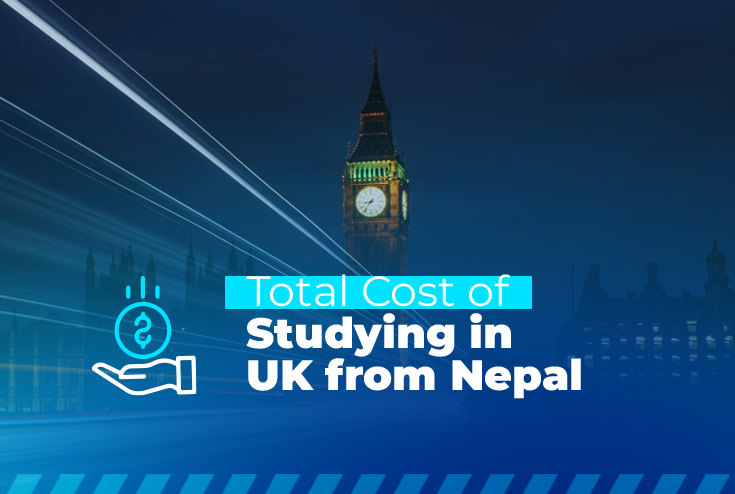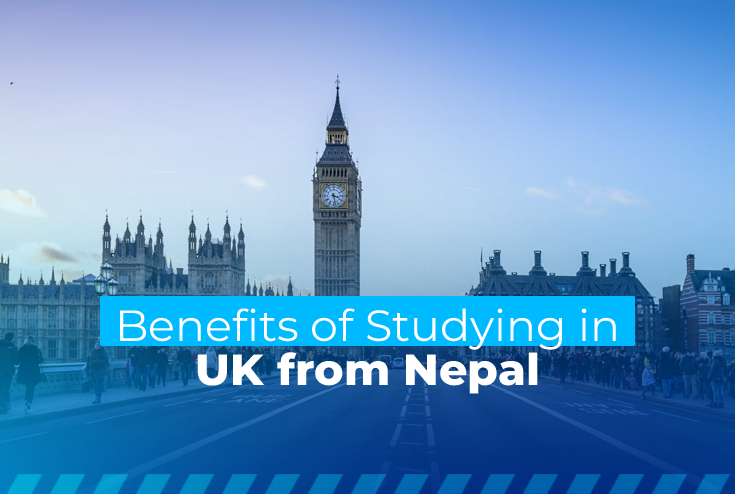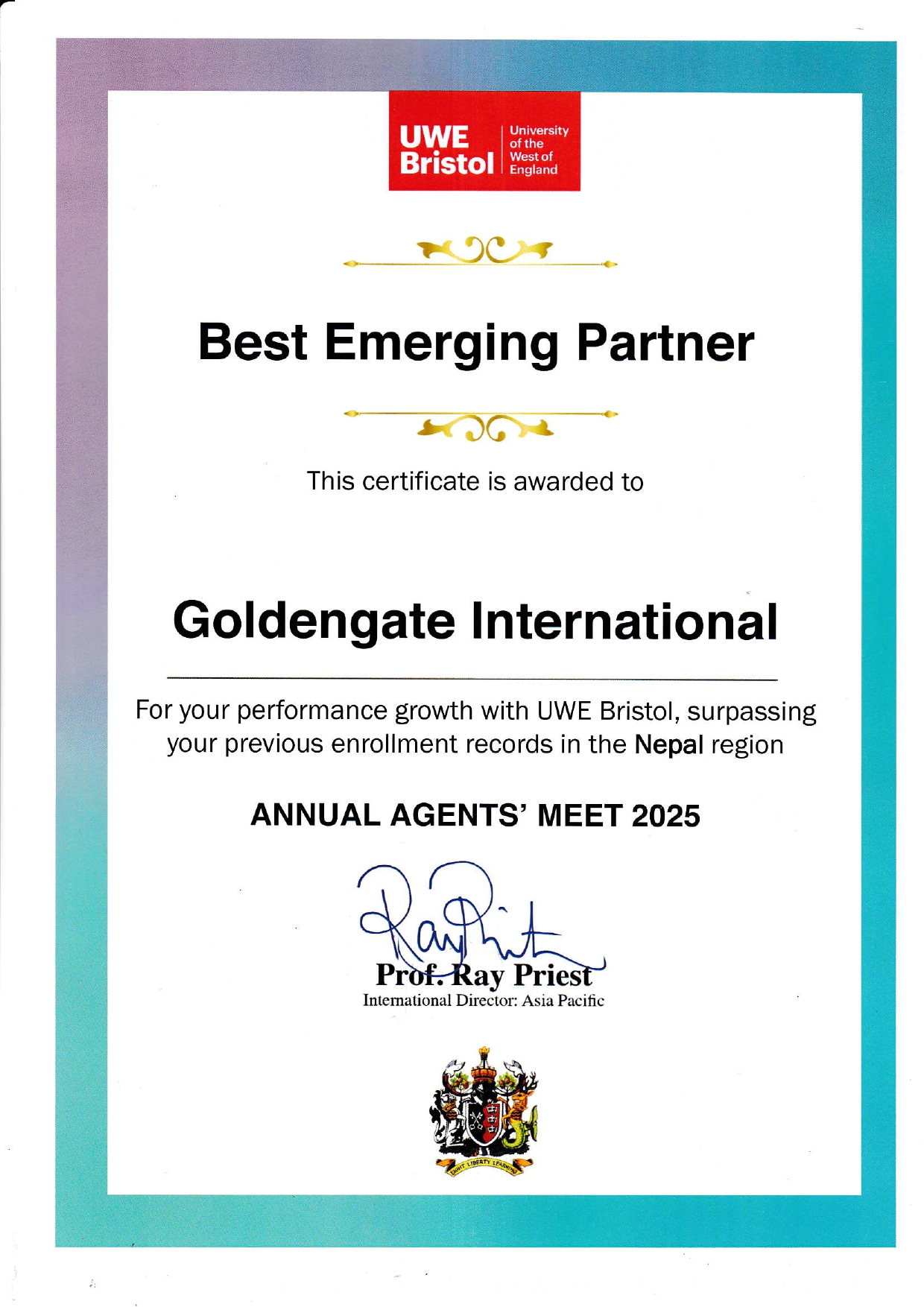

Total Cost of Studying in UK from Nepal
Thinking about studying in the UK is exciting! But the moment you start calculating tuition, living expenses, visa fees, and other hidden costs, the dream can feel overwhelming. Many Nepalese students hesitate or delay their plans simply because they don’t have a clear picture of the total budget required.
The good news? Understanding the complete cost to study in the UK from Nepal is easier than you think. From tuition fees to living costs, additional expenses, and even support for dependents, having a realistic budget can turn uncertainty into confidence.
In this guide, we break down every essential expense, provide practical money-saving strategies, and show how smart planning can help you pursue your UK education without financial stress.
By the end, you’ll not only know the true costs but also how to manage them efficiently, making your dream of studying in the UK achievable and less daunting.
Table of Contents
- How Much does it Cost to Study in the UK from Nepal?
- University Fees UK for International Students
- How Much Bank balance is Required for UK Student Visa?
- Additional Top Expenses in UK for Nepalese Students
- Cost of Studying in the UK with Dependents
- How to Reduce the Cost of Studying in the UK
- Final Takeaways
- Frequently Asked Questions (FAQs)
How Much does it Cost to Study in the UK from Nepal?
You need a total of £22,347 – £48,224 (approx NPR 14–90 lakhs) to cover both your tuition fees and living expenses for studying in the UK as an international student. The cost varies based on your chosen program, university, and location.
In addition, visa costs, flight fares, insurances, and other application requirements may cost around £3,500 – £5,000 (~ NPR 6.5–9.4 lakhs).
So, in total, budget around £30,500 - £53,000 (~ 20.5–99 lakhs) to plan your higher education in the UK.
What are the Living Expenses in the UK for International Students?
As per UKVI’s 2025 rule, you need a minimum living expenses of least £1,483 per month if you are studying in London, and £1,136 per month if studying elsewhere in the UK. This is required for the duration of the course, up to 9 months.
You’ll need to maintain these funds (plus tuition fees) for at least 28 consecutive days in your bank account before applying.
Here’s a detailed breakdown you can expect for your monthly expenses, depending on your location:
|
Expense Type |
London (approx.) |
Outside London (approx.) |
|---|---|---|
|
On-Campus Accommodation |
£848 |
£664 |
|
Shared Rental Rooms |
£750 per person |
£554 per person |
|
Utilities & Bills |
£140 |
£80 |
|
Groceries |
£155 |
£116 |
|
Public Transport |
£103 |
£54 |
|
Social & Miscellaneous |
£150 |
£80 |
|
Mobile Phone Bill |
£18 |
£18 |
University Fees UK for International Students
Tuition fees in the UK vary widely depending on study level, institution, course type, and location. Here’s the latest breakdown for 2025:
Undergraduate (Bachelor’s degrees)
The cost for international students typically ranges from £11,400 to £38,000 per year for a Bachelor’s degree. The exact fee largely depends on the university, the subject you choose, and the scholarships you land. For example, a humanities degree will usually be less expensive than a science or engineering degree, which requires more specialized equipment and labs.
Postgraduate (Master’s degrees)
Master's programs are for students who have already completed a bachelor's degree and want to specialize further. Tuition fees generally fall between £9,000 and £30,000 per year, with some professional degrees, like an MBA, costing more. The average fee is around £17,109. These degrees often take just one year to complete in the UK,, which can be a great way to save on costs.
Top-tier / Highly Specialized Programs
For international students, the fees for highly specialized courses and programs at top-ranked UK universities are typically the most expensive. These fees often range from £23,000 to over £38,000 per year. This category includes prestigious institutions like Oxford and Cambridge, as well as highly competitive fields such as Medicine, Engineering, Business, and Data Science.
Estimated UK Tuition Fees for International Students (2025)
|
Level |
Fee Range (approx.) |
|---|---|
|
Undergraduate |
£11,400 – £38,000 per year |
|
Postgraduate (MA/MSc) |
£9,000 – £30,000 per year |
|
Master’s (Specialized/Elite) |
£13,000 – £35,000 (avg ~£17,000) |
|
Top Universities/Medical, Business, Engineering |
£23,000 – £38,000 |
How Much Bank balance is Required for UK Student Visa?
If you're applying for a UK Student Visa on or after 2 January 2025, UKVI requires you to demonstrate sufficient funds to cover:
- First-Year Tuition Fees: The full cost of your first year's tuition, as stated on your Confirmation of Acceptance for Studies (CAS) document.
- Living Costs (Maintenance Funds): Money for your daily expenses, which depends on where you're studying.
- London: £1,483 per month (up to £13,347 for a 9-month period).
- Outside London: £1,136 per month (up to £10,224 for a 9-month period).
Your total visa funds must cover both your tuition and the correct living costs.
The 28-Day Holding Rule
This is a critical rule for your UK student visa application. The UK Visas and Immigration (UKVI) office needs to see that you've had the full amount of money in your bank account for a continuous period of 28 consecutive days. This period must end no more than 31 days before the date you submit your visa application. This proves the funds are genuinely yours and readily available.
Important Things to Remember
- Sponsorship
If your parents or legal guardian are sponsoring you, their bank account can be used. Just be sure to include a sponsorship letter and proof of your relationship (like a birth certificate) with your application.
- Pre-paid Expenses
Any payments you've already made, such as a tuition deposit or accommodation fees, may reduce the total amount of funds you need to show. These payments must be clearly listed on your CAS document. For instance, pre-paid accommodation can reduce your living cost requirement by up to £1,483.
- Documentation
Make sure your bank statements are clear, easy to read, and meet the 28-day rule. Missing or unclear financial evidence is a common reason for visa application refusal.
Following these guidelines will help ensure your UK student visa application is successful and that you're well-prepared for your studies abroad.
Additional Top Expenses in UK for Nepalese Students
Beyond tuition and living costs, your UK study journey involves several one-time and variable fees, each essential for budget planning. Explore these costs here:
|
Expense Category |
Description |
Amount |
|---|---|---|
|
Student Visa Application Fee |
This is the required fee you'll pay to submit your visa application from Nepal. It's the first step in the formal process. |
£524 (~NPR 98,315) |
|
Immigration Health Surcharge (IHS) |
A mandatory charge that grants you access to the UK’s National Health Service (NHS), ensuring you have medical care while you're there. You pay for this upfront for each year of your course. |
£776 per year (~NPR 145,000) |
|
TB Medical Test |
All applicants are required to undergo this health screening. The cost is specific to the authorized clinic where you get the test done. |
NPR 8,000–10,000 |
|
Biometric / VFS Service Fees |
These fees cover your biometric appointment, where your fingerprints and photo are taken, and the administrative services at the visa application center. |
NPR 3,000–4,000 |
|
IELTS Test |
This is the English language proficiency test that most students need to take. The price can vary depending on the specific test type and whether you choose a paper or computer-based format. |
NPR 27,400–39,600 |
|
NOC (No Objection Certificate) |
You'll need this certificate from the Ministry of Education in Nepal, as it's a key document for releasing the funds required for your studies. |
NPR 2,000 |
|
Travel Insurance |
While not always mandatory, having travel insurance is highly recommended for your peace of mind during your flight and the initial transition period. |
£100–£200 (~NPR 15,000–30,000) |
|
Flight Ticket |
The cost of your one-way flight from Kathmandu to the UK. It’s always a good idea to book this in advance to get a better rate. |
NPR 70,000–80,000 |
|
Initial Setup & Pocket Expenses |
This is the money you'll need for your first few weeks in the UK. It covers things like getting to your accommodation, buying essentials, and general spending before you’re fully settled. |
£500–£800 (~NPR 100,000–160,000) |
Why These Additional Costs Matter
Collectively, these costs can add up to a significant portion of your budget, often overlooked when focusing solely on tuition and rent. Planning for them upfront means:
- Smoother visa approval, since all required payments are traceable.
- Better cash flow management—no surprises upon departure.
- Easier transition to UK life when essentials are budgeted.
Cost of Studying in the UK with Dependents
If you are considering bringing a spouse or children while you study in the UK, you may need an additional budget of around £7,520 – £9,500 (~ NPR 14–18 lakhs) per dependent for their living, visa application and other financial requirements that apply in 2025.
Have a look at the breakdown of these costs for your dependent:
|
Category |
Description |
Amount (GBP / NPR approx.) |
|---|---|---|
|
Visa Application Fee |
Each dependent (spouse/child) must submit a separate Student Dependent Visa application |
£524 / ~NPR 98,315 |
|
Immigration Health Surcharge (IHS) |
Annual health surcharge providing access to NHS for each dependent |
£776/year / ~NPR 145,000 |
|
Living Costs (Inside London) |
Required financial proof for each dependent to cover rent, groceries, and daily expenses |
£7,605/year / ~NPR 1,420,000 |
|
Living Costs (Outside London) |
Required financial proof for each dependent if living outside London |
£6,120/year / ~NPR 1,140,000 |
|
Initial Settlement Expenses |
Upfront costs for accommodation deposits, furniture, kitchen items, school supplies, travel |
£1,000–£1,500 / ~NPR 190,000–285,000 |
So, if you are moving to the UK with family, your budget should include not just tuition and your own living costs, but also these additional expenses. Many families see it as an investment in staying together during studies, but careful financial planning makes the transition much smoother.
Accurate budgeting covering visas, IHS, living costs, and initial setup ensures financial readiness and a smoother transition for both student and family.
How to Reduce the Cost of Studying in the UK
Studying in the UK is a dream for many Nepalese students, but the costs can be significant. The good news is that with proper planning, budgeting, and smart choices, it’s possible to manage expenses effectively without compromising your academic experience. From daily spending habits to part-time work, scholarships, and lifestyle adjustments, there are multiple strategies to reduce your total cost while maximizing the value of your UK education.
How to Save Money in the UK as a Student
Managing finances in a foreign country requires awareness, discipline, and practical strategies. Here are actionable tips that can help Nepalese students stretch their budget:
- Cook at home – Preparing meals yourself is far cheaper than eating out. Consider sharing groceries with flatmates to reduce costs further.
- Use student discounts – Retailers, online platforms, and entertainment venues often offer exclusive student discounts through UNiDAYS or Student Beans.
- Opt for public transport and railcards – Invest in student travel cards or railcards to save up to a third on monthly commuting costs.
- Buy second-hand essentials – Textbooks, laptops, and even furniture can be purchased used at significant savings.
- Track your spending – Use budgeting apps like Monzo or Revolut to monitor and manage daily expenses.
- Join university clubs and free activities – Socialize and network without spending heavily on entertainment.
- Shop smart – Compare prices, look for seasonal sales, and avoid impulse purchases.
- Live slightly outside city centers – Rent is often lower in suburban areas, even accounting for commuting.
- Use NHS services wisely – Once you’ve paid the IHS, healthcare costs are minimal for routine visits.
- Plan travel and flights early – Booking trains, coaches, or flights in advance is cheaper and avoids last-minute premiums.
Scholarships and Funding Opportunities for Nepalese Students
Scholarships play a vital role in reducing the total cost to study in UK from Nepal. Many UK universities, government bodies, and independent organizations provide financial support for deserving international students. While full scholarships are rare, partial funding opportunities can significantly ease tuition and living expenses.
Popular options include:
- Chevening Scholarships – UK government-funded awards for outstanding students with leadership potential.
- Commonwealth Scholarships – Focused on students from developing countries, including Nepal, covering tuition and living costs.
- University-Specific Scholarships – Many institutions offer merit-based or need-based awards such as automatic tuition discounts for international students.
- External Organizations – NGOs and private foundations occasionally support Nepalese students in specific fields like engineering, health, or social sciences.
Since scholarships are competitive, students should prepare strong academic records, polished statements of purpose, and apply well in advance. Refer to our detailed guide on scholarships in UK for Nepalese students for step-by-step insights on how to apply and maximize your chances.
Part-time Work in the UK on a Student Visa
Working while studying is a practical way to reduce the financial burden, but there are rules to follow strictly under UK student visa regulations.
Visa Work Limits
Students on a Tier 4/Student Visa can work up to 20 hours per week during term and full-time during vacations. Failing to comply these conditions may terminate your student visa.
Minimum Wage in the UK
The UK has different minimum wage rates based on age and apprenticeship status. As of April 2025, you must be paid at least:
- Aged 21 and over (National Living Wage): £12.21 per hour
- Aged 18 to 20: £10.00 per hour
- Aged under 18: £7.55 per hour
- Apprentice rate: £7.55 per hour (for those under 19 or in the first year of their apprenticeship)
Note: Unpaid work, including internships, also count towards your 10 or 20 hour term-time working limits.
Popular Part-Time Roles for International Students in the UK
|
Role |
Average Hourly Salary (£) |
|---|---|
|
Retail Assistant |
£9 - £13 |
|
Hospitality (e.g., café, restaurant, hotel staff) |
£10 - £14 |
|
Tutoring |
£14 - £25 |
|
Campus Roles (e.g., library assistant, student ambassador) |
£9 - £15 |
|
Customer Service Representative |
£10 - £14 |
|
Food Delivery Driver |
£8 - £15 |
|
Freelance Writing/Content Creation |
£17+ |
|
Barista |
£9 - £11 |
|
Data Entry Clerk |
£14 - £15 |
|
Warehouse Worker |
£10 - £12 |
Freelancing & Online Work
As an international student in the UK, you are not allowed to freelance or start a business. If you plan to self employ yourself in the UK, consider switching to Graduate visa, that lets you work in the UK after completing your studies.
Benefits of Part-time Work
- Offsets living costs such as groceries, transport, or leisure.
- Provides practical UK work experience and networking opportunities.
- Helps students develop time management and soft skills beneficial for future careers.
Low-Cost Universities in the UK for Nepalese Students
Studying in the UK does not always mean enrolling in the most expensive institutions. Several universities offer excellent degrees at relatively lower tuition fees, making them appealing for Nepalese students mindful of their budgets. These universities balance quality education with affordability and are especially popular among international students from South Asia.
Here are some UK universities known for comparatively lower tuition costs:
- University of Bedfordshire – Undergraduate fees from £12,350 per year. The university is known for career-focused degrees and strong industry links.
- Leeds Beckett University – Undergraduate courses start around £12,500. It offers a wide range of programs in business, computing, and creative fields.
- Teesside University – Tuition starts at approximately £12,000 annually, with scholarships often available for South Asian students.
- University of West London (UWL) – Fees begin at £12,750. UWL is well-regarded for hospitality, business, and nursing degrees.
- Staffordshire University – Offers degrees starting at £12,500, particularly strong in technology and digital industries.
These universities maintain solid academic reputations while keeping fees manageable. When compared with the average tuition cost in the UK (between £13,000–£22,000 per year), they present a clear opportunity for Nepalese students to reduce financial strain while still gaining a recognised UK qualification.
Final Takeaways
- The toal cost of studying in the UK from Nepal can range between £22,000 and £40,000 per year, including tuition and living expenses
- The UK student visa fee is £524, with an additional Immigration Health Surcharge of £776 per year.
- Students need to demonstrate financial evidence of £1,483 per month in London and £1,136 per month outside London.
- Bringing dependents requires additional financial evidence and visa applications.
- Various scholarships and part-time work are available to help offset costs.
- Utilize student discounts, cook at home, and consider affordable accommodation options.
- Have a realistic budget plan for a smooth application process. Make informed decisions and consult with education counsellors if you need any help.
Plan Your UK Education with Experts in Nepal!
If you're ready to take the next step towards your UK education, consider reaching out to educational consultancies like Golden Gate International, which offer comprehensive services including test preparation, consulting, and visa assistance. Their expertise can guide you through the process, ensuring a smooth transition to studying in the UK.
Frequently Asked Questions (FAQs)
1. Can I study in the UK under 10 lakhs (NPR)?
Studying in the UK with a budget under NPR 10 lakhs is challenging but not impossible. To manage within a limited budget, consider applying for scholarships, choosing affordable universities, and exploring part-time work opportunities.
2. How much is a 3-year degree in the UK?
On average, tuition fees in the UK range from £11,000 to £25,000 per year, totaling £33,000 to £75,000 over three years. Adding living expenses of £12,000 to £15,000 per year, the total cost can be between £57,000 and £120,000. Research specific universities and courses to get accurate estimates.
3. Is the UK a cheap place to study?
Tuition fees and living costs in the UK are higher but the shorter degrees cut the cost compared to many other countries. However, with careful planning, budgeting, and by taking advantage of scholarships and part-time work opportunities, it is possible to manage expenses effectively.
4. How much would it cost to study MBBS in the UK?
Studying MBBS in the UK is one of the most expensive courses for international students. Tuition fees range from £30,000 to £60,000 per year, depending on the university. The total cost for a 5-year MBBS program can be between £150,000 and £300,000. Living expenses add approximately £12,000 to £15,000 annually.
5. How much is the student visa fee for the UK from Nepal in 2025?
As of 2025, the UK student visa fee for applicants from Nepal is £524 (approximately NPR 98,315). This fee applies to both the main applicant and dependents.
6. Which university is the cheapest in the UK?
Several universities in the UK offer affordable tuition fees. Universities such as the University of Bedfordshire, Leeds Beckett University, and Teesside University have relatively lower tuition fees compared to others. It's important to consider not only tuition fees but also living costs, course offerings, and university rankings when choosing a university.
7. Is studying in the UK worth the cost?
Studying in the UK offers numerous benefits, including high-quality education, exposure to diverse cultures, and enhanced career prospects. While the costs are significant, the investment can lead to valuable experiences and opportunities. It's essential to weigh the costs against the potential benefits and plan accordingly.
Also Read


